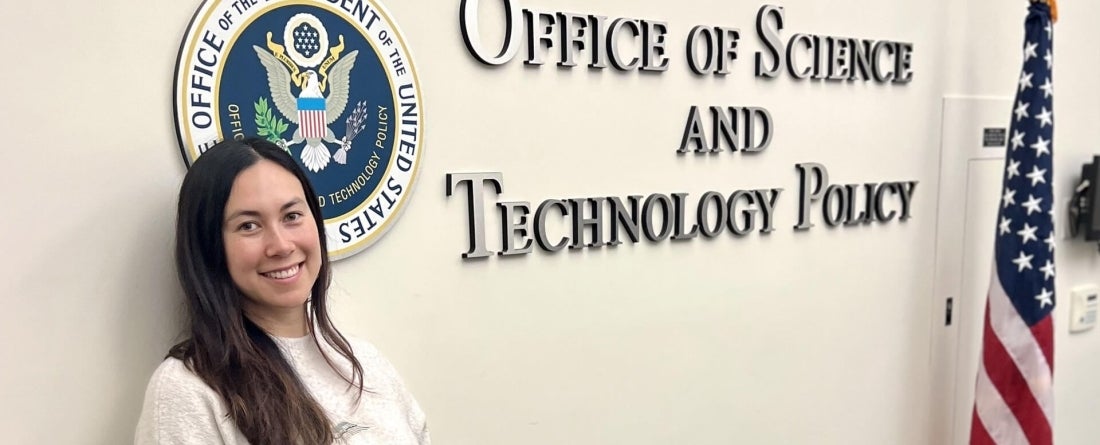
When Ella Clarke MPP ’21 became a Presidential Management Fellow finalist, which agency she’d end up at was a mystery. She never imagined that her time as a fellow would lead her to the White House. The PMF Program is a leadership development program created more than three decades ago by an executive order designed to develop a cadre of potential government leaders. PMF provides leadership and management training and a rotation of challenging work assignments in order to cultivate a lasting bond with public service. In addition to a long-term placement with a government agency, PMF fellows have the opportunity to rotate to another agency or office within their home agencies for four to six month assignments.
Clarke returned to graduate school after five years in nonprofit philanthropy in order to shift her career toward the climate policy field. While she didn’t initially see herself working in the federal government, she was inspired to apply for the PMF program thanks to her mentor and supervisor, Rosina Bierbaum, an SPP Research Professor and the Roy F. Weston Chair in Natural Economics. She chose to pursue the fellowship due to the Biden-Harris Administration’s efforts on climate change and equity, and describes the experience as “nothing short of extraordinary.”
When Clarke became a fellow, she accepted an appointment in the U.S. Department of Housing and Urban Development’s Office of Community Planning and Development, where she has built out a suite of resources to support local climate action, communicated HUD’s critical role in achieving the Biden-Harris Administration’s climate justice goals, and helped publish HUD’s Climate Action Plan.
I cannot underscore the importance of networking and spending time learning from former PMF fellows – their wealth of knowledge, experience and advice is worth its weight in gold.Ella Clarke MPP '21
“I cannot underscore the importance of networking and spending time learning from former PMF fellows – their wealth of knowledge, experience and advice is worth its weight in gold,” said Clarke. When the occasion arose for Clarke to explore another agency for her PMF rotation, her boss at HUD helped her secure an interview with the White House Office of Science and Technology Policy.
OSTP’s mission is to maximize the benefits of science and technology to advance health, prosperity, security, environmental quality and justice for all Americans. Clarke’s placement on the Climate and Environment team allowed her to focus on nature-based solutions for people and the planet, climate resilience, climate services, and science communication and engagement. Her favorite aspect of working at the White House was being a part of an incredibly talented team of scientists and policy experts who all care deeply about tackling the climate crisis and advancing equity, but the location – working in the Eisenhower Executive Office Building and walking past the West Wing – was an added bonus. “It's incredibly surreal to work in the executive office and I feel so, so lucky.”
Clark recently concluded her time at the White House Office of Science and Technology Policy at the end of December after a year working on their Climate and Environment team. She has since returned to HUD, where she serves as the policy advisor for the Office of Environment and Energy. In this role, she helps to manage the implementation of HUD’s Climate Action Plan and build the agency's reputation as a key federal player in domestic climate policy.
In thinking about her future goals, Clarke reflected, “I have found that I really thrive at the level within an organization that focuses on the 30,000 foot view – strategic goals and vision, with deep connections to the relevant science. I’m excited about building my expertise at the intersection of climate resilience, nature, and equity; and I also love project managing, covening program experts towards a common goal, and translating our work so it's accessible and exciting for the general public. Being at the White House helped me better understand that 30,000 foot view for the entire federal government, which is a great experience to bring back to HUD. Dean Orr once described himself as an ‘unapologetic generalist’ and I've really been trying to channel that!”
Disclaimer: This story and any opinions presented in it do not represent the views of the White House Office of Science and Technology Policy.



